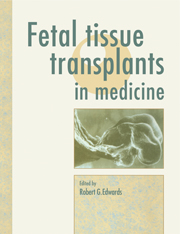Book contents
- Frontmatter
- Contents
- List of contributors
- Preface
- 1 Differentiation and transplantation of embryonic cells in mammals
- 2 Organogenesis and central nervous system development
- 3 Experimental human hematopoiesis in immunodeficient SCID mice engrafted with fetal blood-forming organs
- 4 Ontogeny of human T- and B-cell immunity
- 5 The procurement of human fetal tissues for clinical transplantation. Practice and problems
- 6 Transplantation of fetal haemopoietic and lymphopoietic cells in humans, with special reference to in utero transplantation
- 7 The biology of fetal brain tissue grafts: from mouse to man
- 8 Clinical results of transplanting fetal pancreas
- 9 The suitability of fetal and infantile donors for corneal transplantation
- 10 Transplantation of ovaries and testes
- 11 Cell grafting and gene therapy in metabolic diseases
- 12 The low temperature preservation of fetal cells
- 13 Law and ethics of transplanting fetal tissue
- Appendix: Code of practice on the use of fetuses and fetal material in research and treatment
- Brief bibliography on various aspects of transplanting fetal 337 tissue
- Index
4 - Ontogeny of human T- and B-cell immunity
- Frontmatter
- Contents
- List of contributors
- Preface
- 1 Differentiation and transplantation of embryonic cells in mammals
- 2 Organogenesis and central nervous system development
- 3 Experimental human hematopoiesis in immunodeficient SCID mice engrafted with fetal blood-forming organs
- 4 Ontogeny of human T- and B-cell immunity
- 5 The procurement of human fetal tissues for clinical transplantation. Practice and problems
- 6 Transplantation of fetal haemopoietic and lymphopoietic cells in humans, with special reference to in utero transplantation
- 7 The biology of fetal brain tissue grafts: from mouse to man
- 8 Clinical results of transplanting fetal pancreas
- 9 The suitability of fetal and infantile donors for corneal transplantation
- 10 Transplantation of ovaries and testes
- 11 Cell grafting and gene therapy in metabolic diseases
- 12 The low temperature preservation of fetal cells
- 13 Law and ethics of transplanting fetal tissue
- Appendix: Code of practice on the use of fetuses and fetal material in research and treatment
- Brief bibliography on various aspects of transplanting fetal 337 tissue
- Index
Summary
THE ONTOGENY OF THE HUMORAL and the cell-mediated immune responses, which are the primary mediators of successful organ and hematopoietic stem cell transplantation, is reviewed in this chapter. With the growing interest in using the fetus either as the source or as the recipient of stem cell or organ transplants, it is imperative that we understand the ontogeny of these two aspects of the immune system. Humoral immunity results from the antigenic stimulation of bonemarrow- derived or B lymphocytes and their subsequent differentiation into plasma cells capable of secreting neutralizing antibodies. Cellular immunity is the consequence of antigenic stimulation of thymusderived or T lymphocytes, which then function to kill cellular targets or to help B cells or cytotoxic T cells to respond appropriately to antigenic exposure.
Antibody- and cell-mediated immunity develop during fetal life and the ontogeny of the immune system is currently under intensive study (Figure 4.1). Hematopoietic stem cells originate in the yolk sac and within a few weeks of gestation are found in the human fetal liver. During midgestation the bone marrow becomes the primary organ of hematopoiesis. The maturation and differentiation of hematopoietic stem cells into B lymphocytes is much better understood than that of T cells; the characterization of both pathways has benefitted greatly by recent advances in molecular biological techniques that have allowed the identification of cell surface molecules and gene rearrangement events that are expressed sequentially in differentiating precursor populations.
Blymphocytes are the precursors of antibody-producing plasma cells and are responsible for the humoral immune response. Antibodies are antigen-specific immunoglobulins that are essential for host protection against bacteria and many viruses. Immunoglobulin production occurs in response to the binding of antigen to receptors on the B-cell surface membrane. This process usually requires the cooperation of helper T lymphocytes to secrete soluble factors, referred to as lymphokines, that are important for B-cell activation, proliferation and differentiation. However, antibody synthesis by some B cells does not require helper T cells, particularly those B cells producing antibodies against encapsulated organisms. Such T-cell-independent B cells are not present during gestation, do not become functional until the second year of life (Davie, 1985), and will not be discussed in detail here.
- Type
- Chapter
- Information
- Fetal Tissue Transplants in Medicine , pp. 97 - 128Publisher: Cambridge University PressPrint publication year: 1992



